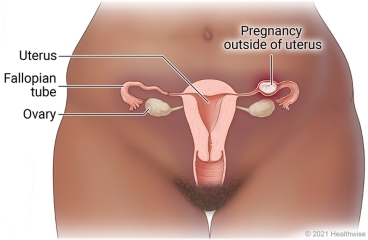
Overview
An ectopic pregnancy occurs when a fertilized egg grows outside of the uterus. In a normal pregnancy, the fertilized egg grows inside the uterus.
In most ectopic pregnancies, the egg grows in a fallopian tube. This is also called a tubal pregnancy. Sometimes the egg grows in an ovary or some other place in the belly. But this is rare. An ectopic pregnancy never becomes a normal pregnancy and birth.
You had surgery to treat your ectopic pregnancy. This was done to prevent dangerous problems. After your surgery, you may have vaginal bleeding that's like a period. It may last for about a week. You may need a few weeks to recover. And you may also need to have follow-up blood tests.
You should be able to have a normal pregnancy in the future. But you may have a higher risk for more ectopic pregnancies. Tell your doctor right away if you get pregnant again.
Follow-up care is a key part of your treatment and safety. Be sure to make and go to all appointments, and call your doctor if you are having problems. It's also a good idea to know your test results and keep a list of the medicines you take.
How can you care for yourself at home?
- Get plenty of rest. You may be more tired than normal for a few weeks.
- Try to walk each day. Start by walking a little more than you did the day before. Bit by bit, increase the amount you walk.
- Avoid moving quickly or lifting anything heavy until your doctor tells you it is safe to do your normal activities.
- Ask your doctor when you can have vaginal sex again.
- Your doctor might want you to use sanitary pads if you have vaginal bleeding. Using pads makes it easier to keep track of your bleeding. You may use tampons during your next period. It should start in 3 to 6 weeks.
- Be safe with medicines. Read and follow all instructions on the label.
- If the doctor gave you a prescription medicine for pain, take it as prescribed.
- Store your prescription pain medicines where no one else can get to them. When you are done using them, dispose of them quickly and safely. Your local pharmacy or hospital may have a drop-off site.
- If you are not taking a prescription pain medicine, ask your doctor if you can take an over-the-counter medicine.
- Take care of your incision. If you have strips of tape on the cut (incision) the doctor made, leave the tape on for a week or until it falls off. Wash the area daily with warm, soapy water, and pat it dry. Change the bandage every day.
- Pay attention to your feelings. If you're sad and it's not getting any easier, talk with your doctor or a counselor.
- Talk to your doctor if you want to try to get pregnant soon. The doctor can tell you when it's safe to do so.
- If you don't want to get pregnant, ask your doctor about birth control. It's safe to use birth control during your recovery. It's possible to get pregnant again before your next period starts.
When should you call for help?
Call 911 anytime you think you may need emergency care. For example, call if:
- You passed out (lost consciousness).
- You have chest pain, are short of breath, or cough up blood.
- You have severe vaginal bleeding. This means that you are soaking through your usual pads every hour for 2 or more hours.
- You have sudden, severe pain in your belly or pelvis.
- You feel you cannot stop from hurting yourself or someone else.
Where to get help 24 hours a day, 7 days a week
If you or someone you know talks about suicide, self-harm, a mental health crisis, a substance use crisis, or any other kind of emotional distress, get help right away. You can:
- Call the Suicide and Crisis Lifeline at 988.
- Call 1-800-273-TALK (1-800-273-8255).
- Text HOME to 741741 to access the Crisis Text Line.
Consider saving these numbers in your phone.
Go to 988lifeline.org for more information or to chat online.
Call your doctor now or seek immediate medical care if:
- You are dizzy or lightheaded, or you feel like you may faint.
- You have new or worse pain in your belly or pelvis.
- You have vaginal discharge that smells bad.
- You cannot pass stools or gas.
- You are sick to your stomach or cannot drink fluids.
- You have loose stitches, or your incision comes open.
- Bright red blood has soaked through the bandage over your incision.
- You have signs of infection, such as:
- Increased pain, swelling, warmth, or redness.
- Red streaks leading from the incision.
- Pus draining from the incision.
- A fever.
- You have symptoms of a blood clot in your leg (called a deep vein thrombosis), such as:
- Pain in the calf, back of the knee, thigh, or groin.
- Swelling in the leg or groin.
- A color change on the leg or groin. The skin may be reddish or purplish, depending on your usual skin color.
Watch closely for changes in your health, and be sure to contact your doctor if:
- You do not get better as expected.
Where can you learn more?
Go to http://www.healthwise.net/patientEd
Enter J774 in the search box to learn more about "Treating an Ectopic Pregnancy With Surgery: Care Instructions".
Current as of: April 30, 2024
Author: Ignite Healthwise, LLC Staff
Clinical Review Board
All Ignite Healthwise, LLC education is reviewed by a team that includes physicians, nurses, advanced practitioners, registered dieticians, and other healthcare professionals.

